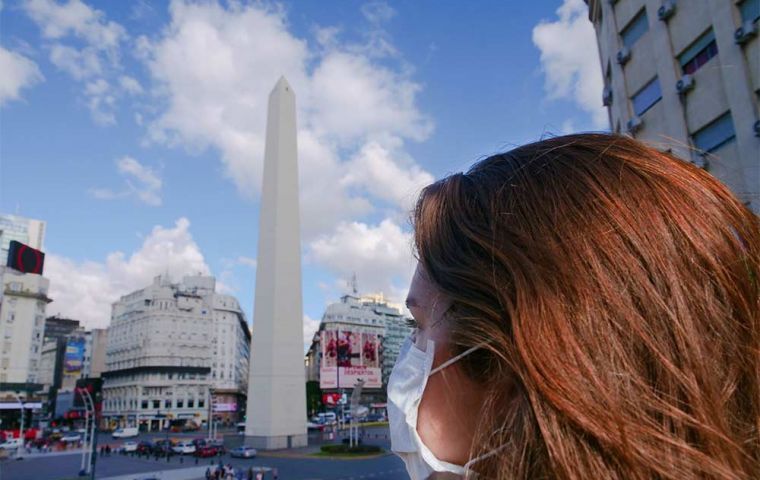MercoPress. South Atlantic News Agency
Argentine scientists foresee return of COVID-19 protocols
 López also said that the increasing curve of COVID-19 infections was due to the “low amount of booster vaccines” administered
López also said that the increasing curve of COVID-19 infections was due to the “low amount of booster vaccines” administered Argentine healthcare professionals are pushing for the return of mandatory facemasks and a speedy update of people's vaccination schemes in light of the increasing number of COVID-19 cases nationwide.
The City of Buenos Aires has once again been reported to be where the largest number of detections has taken place as the epidemiological scenario enters its fourth week of sustained increase. Hence, the return of facemasks and other measures is not to be ruled out while the situation in neighboring Brazil and Chile is monitored.
Brazil has already reinstated facial coverings for airplane travel and also at airports. The protection device has also been reintroduced on public transportation in the city of Sao Paulo, the largest in the continent.
“We have been saying that the mask should continue to be worn in certain situations, such as in public transportation, in places where there is a large number of people with little air conditioning, and in meetings where the environments are more closed,” infectiologist Eduardo López told El Cronista.
López also said that the increasing curve of COVID-19 infections was due to the “low amount of booster vaccines” administered. According to the Public Vaccination Monitor, of the 41,049,293 schemes initiated two years ago, only 6,261,537 people have taken a second booster, which is “fundamental for the sub-lines [of the Omicron strain] that are circulating today in Argentina.”
Physician Luis Camera told El Cronista that by January or February of 2023 it will be necessary to strengthen the COVID-19 protection schemes in Argentina with a fifth dose, followed by a yearly application thereafter.
“There are going to be these back-and-forth outbreaks over time. Yes, I also think it will be surmountable but what we can't help but see, as a kind of Achilles heel, is the low booster vaccination in the young population. This is where the contagions will come from,” he argued. Camera also foresees the return of facemasks in some districts. He added that the new, “extremely contagious” sub-variants will make it “very difficult” to move forward with other types of restrictions.
“The only thing that is really useful is to have at least three doses of vaccine for young people, four for older people, and, eventually, a fifth,” he said.
Infectiologist Hugo Pizzi explained that the current scenario with newer variants of SARS-CoV-2 is “different” from those registered in 2020 and 2021, since “now with the vaccines, the resistance of the virus changes.”
“The sublines have a shorter incubation period. It is now only 2 to 4 days, which makes transmissibility much easier,” López also said.
According to Argentina's Health Ministry, confirmed cases of coronavirus by clinical-epidemiological criteria in a patient must meet at least two of the following parameters at the same time: fever, cough, odynophagia, shortness of breath, vomiting/diarrhea, headache/myalgia, rhinitis/nasal congestion, present Anosmia/dysgeusia.
Patients who meet at least one of the following epidemiological criteria will be diagnosed with SARS-COV2:
- Having had close contact with a confirmed case in the past 10 days;
- Having participated in an event or social/workplace or other space where at least 3 confirmed cases have been reported (outbreak),
- Reside in an area with an incidence greater than 500 cases/100,000 inhabitants in the last 14 days where the criterion has been activated. (Source: El Cronista)




Top Comments
Disclaimer & comment rulesCommenting for this story is now closed.
If you have a Facebook account, become a fan and comment on our Facebook Page!